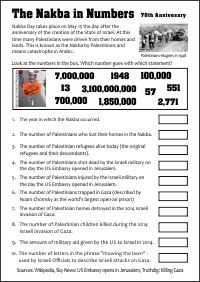
Communities have always recognized two things. First, that which we need for survival should never belong to an individual. It should be the common wealth. Second, it should be managed as the common wealth. Therefore, community structures of responsibilities have to be put in place.
Vandana Shiva
Water Wars
The Nakba in Numbers
The Nakba is not a just a memory, it is an ongoing reality. We can accept that we all must eventually die; in Gaza, the tragedy is that we don’t get to live.
Ahmad Abu Rtemah
 This sheet has ten statements focusing on the Nakba and the invasion of Gaza by Israel in 2014. The reason for combining these events is to focus attention on the historic and systematic subjugation of the Palestinian people by the State of Israel.
This sheet has ten statements focusing on the Nakba and the invasion of Gaza by Israel in 2014. The reason for combining these events is to focus attention on the historic and systematic subjugation of the Palestinian people by the State of Israel.
Suggested Procedure:
Start by asking if anyone has heard of the Nakba and/or Nakba Day. Then illicit what the students know about current events taking place in Israel and Gaza. Then handout the sheet go through the opening statement. With a small group of students go through each of the statements in turn. With a large group divide students into groups of 3-4 and have each group decide its own answers before going through the answers together. Finish with a discussion on what the phrase "mowing the lawn (grass)" means.
Here are the numbers in order:
1948, 700,000. 7,000,000, 57, 2771, 1,850,000, 100,000, 551, 3,100,000,000, 13
Points to Consider and Mention:
1. 57 people were shot dead by Israeli forces on Monday, the day the US embassy opened. The total number of deaths was 58. An eight-month old baby died inhaling tear gas.
2. The Great Return March is a series of demonstrations that began Friday, March 30th, 2018. The Israeli Government had ample time to plan a response and chose to use tear gas and live fire. Is this an example of mowing the lawn? Read Steven Chovanec's Truthout article: The Massacre in Gaza: A Deliberate and Calculated Policy.
3. Israel will never voluntarily allow Palestinians their right of return as this would mean the end of Israel as a Jewish state (As of 2018 there are around 6.5 million Jews and 8.5 million Arabs)
4. The total amount of aid given to Israel by the US since World War II amounts to around $121 billion (not adjusted for inflation). The US has used its veto power in the UN National security council to protect Israel more than any other issue (Checking out the exact figures could be given as homework or as an in-class online exercise).
5. Would the current situation be different if Donald Trump had also recognised the Palestinian claim for Jerusalem to be the capital of a Palestinian state?
Please use the contact button (bottom-right) to send suggested improvements to these notes or the sheet itself.
Last revision May 2018
getfile: The Nakba in Numbers
B5 Size, 1 page (1.22 mb)- Top Page
- Splog!
- Articles
- Games
- Across The Table
- Add One More
- Anaconda
- Be A Monster!
- Black Hole (board game)
- Bombs Away!
- Catch!
- Catch-Caught-Caught!
- Centipede
- Charades
- Co-operative Quiz
- Crocodile
- Dice Stack
- Fast Food Tag
- Find My Number
- Find The Penny
- Football
- The Happy Game
- Line Up!
- Maze Challenge
- Natty Narration
- Nose Nose Nose
- One Step Forward!
- Pair Fluency Match 7 - Death Wish
- Pair Fluency Match 7 - Go Green!
- Parrot Parade
- Passport Control
- Reach The Top!
- Snake
- SockIt!
- Tickle Time
- What Cards
- Which One?
- Whose Shoe?
- World Cup Football 2018
- You, You, Me!
- Wake Up
- Packs
- Sheets
- Songs and Music
- Strips (songs and otherwise)
- Stories
- Techniques
- Video
- Environment
- Japan
- The 75th Anniversay of the bombing of Hiroshima
- The 75th Anniversay of the bombing of Nagasaki
- Cars in Japan
- Coronavirus Olympics
- Forest Bathing
- Japan and the Summit
- Japan and World War Two
- Multiculural Japan?
- Olympics Two Tokyos
- Plastic in Japan
- Return to Fukushima
- The Anniversary too Important to Cancel
- Typhoon Jebi
- Yayoi Kusama's Infinity
- Other
- This Week In History
- January, February, March
- April, May, June
- Sub Menu Item
- This Week in History: April 8-10
- This Week in History: April 12-15
- This Week in History: April 19-24
- This Week in History: April 24-26
- This Week in History: May 6-11
- This Week in History: May 11-14
- This Week in History: May 18-23
- This Week in History: May 25-31
- This Week in History: June 1-5
- This Week in History: June 11-14
- This Week in History: June 22-27
- This Week in History: June 15-21
- This Week in History: June 29 - July 5
- July, August, September
- This Week in History: July 6-12
- Sub Menu Item
- This Week in History: July 14-19
- This Week in History: July 27-31
- This Week in History: August 2- 6
- This Week in History: August 17-21
- This Week in History: August 27-30
- This Week in History: August 31 - September 6th
- This Week in History: September 7-13
- This Week in History: September 22-27
- This Week in History: September 14-20
- This Week in History: September 28 - October 4
- October, November, December
- Quizes
- Vocab



